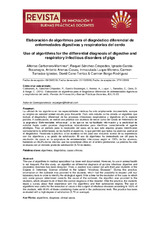Mostrar el registro sencillo del ítem
Elaboración de algoritmos para el diagnóstico diferencial de enfermedades digestivas y respiratorias del cerdo
| dc.contributor.author | Carbonero-Martínez, Alfonso | |
| dc.contributor.author | Sánchez Céspedes, Raquel | |
| dc.contributor.author | García-Bocanegra, Ignacio | |
| dc.contributor.author | Arenas-Casas, Antonio | |
| dc.contributor.author | Luque-Moreno, Inmaculada | |
| dc.contributor.author | Tarradas-Iglesias, Carmen | |
| dc.contributor.author | Cano Terriza, David | |
| dc.contributor.author | Borge-Rodríguez, Carmen | |
| dc.date.accessioned | 2020-03-03T08:25:56Z | |
| dc.date.available | 2020-03-03T08:25:56Z | |
| dc.date.issued | 2019 | |
| dc.identifier.issn | 2531-1336 | |
| dc.identifier.uri | http://hdl.handle.net/10396/19675 | |
| dc.description.abstract | La utilidad de los algoritmos en las especialidades médicas ha sido ampliamente documentada, aunque su empleo en sanidad animal resulta poco frecuente. Para este estudio se ha creado un algoritmo que incluyó el diagnóstico diferencial de los procesos infecciosos respiratorios y digestivos en la especie porcina. A continuación, se realizó una práctica con alumnos de tercer curso del Grado en Veterinaria de la asignatura “Enfermedades Infecciosas”, a los que se les ha facilitado información y la posibilidad de solicitar hasta cuatro pruebas diagnósticas laboratoriales para identificar correctamente el agente etiológico. Tras un período para la resolución del caso, en la que solo algunos grupos identificaron correctamente la enfermedad, se les facilitó el algoritmo, lo que permitió que todos los alumnos acertaran el diagnóstico. Finalizada la práctica, a los alumnos se les pasó una encuesta acerca de su experiencia con los algoritmos y su grado de satisfacción. El uso de algoritmos ha demostrado ser útil para la resolución de casos en la asignatura de enfermedades infecciosas según el 100% de los alumnos, habiendo un 96,9% de los mismos que los consideran útiles en el ámbito profesional. La práctica ha sido evaluada con un elevado grado de satisfacción (8,72 de media). | es_ES |
| dc.description.abstract | The use of algorithms in medical specialties has been well documented. However, its use in animal health is not frequent. For this study, an algorithm on differential diagnosis of porcine infectious digestive and respiratory disorders has been designed. Then, a practice was carried out with third year students of the Degree in Veterinary Science enrolled in the subject "Infectious Diseases". During this practice, information on the outbreak was provided to the students, which had the possibility to request until four laboratory tests in order to identify the etiological agent. After a time for the resolution of the case, in which only some groups determined correctly the cause of the outbreak, the algorithm was provided to the students, which allowed to all of them the correct diagnosis of the disorder. After the practice, the students made a survey about their experience with the algorithms and their satisfaction degree. The use of algorithms was useful for the resolution of cases in the subject of infectious diseases according to 100% of the students, with 96.9% of them considering them useful in the professional work. The practice has been evaluated with a high degree of satisfaction (8.72 on average). | es_ES |
| dc.format.mimetype | application/pdf | es_ES |
| dc.language.iso | spa | es_ES |
| dc.publisher | UCOPress | es_ES |
| dc.rights | https://creativecommons.org/licenses/by-nc-nd/4.0/ | es_ES |
| dc.source | Revista de innovación y buenas prácticas docentes 8(4), 16-23 (2019) | es_ES |
| dc.subject | Algoritmos | es_ES |
| dc.subject | Diagnóstico | es_ES |
| dc.subject | Casos clínicos | es_ES |
| dc.subject | Algorithms | es_ES |
| dc.subject | Diagnose | es_ES |
| dc.subject | Clinical cases | es_ES |
| dc.title | Elaboración de algoritmos para el diagnóstico diferencial de enfermedades digestivas y respiratorias del cerdo | es_ES |
| dc.title.alternative | Use of algorithms for the differential diagnosis of digestive and respiratory infectious disorders of pigs | es_ES |
| dc.type | info:eu-repo/semantics/article | es_ES |
| dc.relation.publisherversion | http://www.uco.es/ucopress/ojs/index.php/ripadoc/index | es_ES |
| dc.rights.accessRights | info:eu-repo/semantics/openAccess | es_ES |

